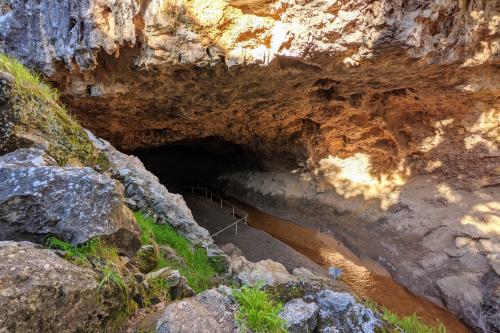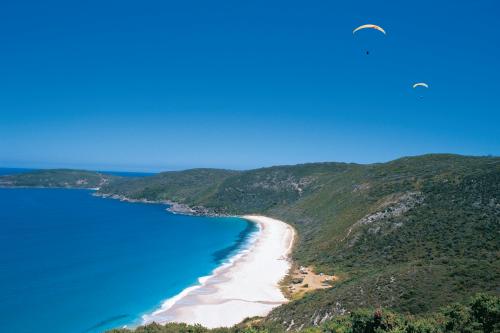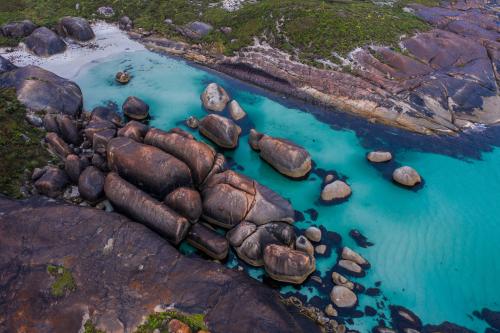There are thousands of kilometres of unsealed, sand, gravel and rocky roads and tracks in WA’s parks and reserves that should not be ridden or driven with regular road vehicles. But, exploring in a four-wheel drive vehicle or on an adventure motorcycle can open up many new places for you to enjoy. However, while having fun and adventure, you must remember to stay on designated roads and tracks. Some tips and rules to remember:
- Check the latest mapping information for designated public access.
- Seek permits where necessary as fines do apply.
- Vehicles are not permitted on walking or cycling tracks and you should never drive where there is no existing access.
- Remember WA’s road and traffic laws apply! All vehicles and drivers or riders must be licensed, and the vehicle must be roadworthy.
- Designated off-road vehicle areas are the only places you can ride or drive if you do not have a driver’s licence or vehicle road registration.
- Your off-road vehicle must be registered with the Department of Transport.
Information on road worthiness, licensing, permits and more can be found at the Department of Transport. You can also find information about four-wheel drive and motorbike trails at Trails WA and the Recreational Trailbike Riders Association of WA. For information and maps of permitted areas visit Department of Local Government, Sport and Cultural Industries.
Adventure bike riding
Adventure bike riding has grown significantly in WA over the last decade, taking off-road to the next level. Unless you plan to ride within a designated off-road vehicle area, you must ride on designated roads and tracks. There is a growing trend to ride ‘off-road’, creating bike tracks through the forest and reserves, but this is illegal and fines apply for illegal activity.
For information about adventure motorcycling visit Recreational Trailbike Riders Association of WA.
Safe for you and the environment
One of the biggest environmental threats to biodiversity in the south-west in Phytophthora dieback. Dieback destroys native plants, threatening them with extinction and disrupting vital habitats for wildlife. Vehicles can easily carry dieback accidentally, collected and deposited by driving through mud and puddles. To avoid contributing to its spread:
- Always maintain a clean vehicle, especially the tyres, wheels and undercarriage, before entering and after leaving parks.
- Avoid puddles and muddy areas to lessen the spread of dieback and observe road closures as it is sometimes necessary for park roads and tracks to be closed to vehicles.
Track and road closures
Parks, tracks and roads can be closed at anytime. Stay informed about safety, access, and conditions that could affect your visit, such as closures due to extreme weather, natural disasters or maintenance. Check Park Alerts before you go.
Other environmental and safety reasons affecting the closure of park roads include the Department of Water and Environment Regulation restrictions for the protection of public drinking water supplies. Some maps, particularly older editions, may show tracks without indicating that they are closed. Closed roads and tracks will be sign posted at their location.
Special considerations apply for travelling in coastal national parks and on beaches. The Code Off Road brochure, by Track Care WA, provides a guide to safe and responsible driving in these fragile and potentially hazardous areas.
Always follow the seven principles of Leave No Trace to minimise your impact on the natural and cultural heritage of the areas you are visiting.
Planning and preparation
Safe travel begins with research and preparation. When planning to travel to remote areas or places where a four-wheel drive vehicle is recommended, you should understand what type of vehicle and auxiliary equipment is needed, what level of experience is necessary and what conditions you are likely to encounter in the areas you travel through. Some of this information is available in a number of specialist road atlases. Make sure that your copy is a current edition and remember that the authors are responsible for the content.
In addition to learning the driving, riding and navigation skills needed for these roads and tracks, you need to be equipped and capable of, reducing tyre pressures and reinflation as a basic necessity, vehicle recovery and repairs, together with bush awareness and outback survival basics. These are all specialist skills that require specialist training. Be prepared to invest in training and attempt trips and expeditions appropriate to your experience and the experience of your group. Travel in groups when you can. For more information see Safety and Travelling in remote locations.
Join a tour
Commercial tours offer four-wheel drive experiences in WA's parks. A range of tour types are available where you can either travel in the operator’s vehicle or ‘tag-along’ with your own vehicle in a convoy with other tour participants.
There are many clubs that offer benefits such as the skill and knowledge of experienced members, club equipment, social events, group tours and the opportunity to contribute to track classification and maintenance.
For information on activities and links to various training providers, visit one of the the peak four-wheel drive organisations websites:


